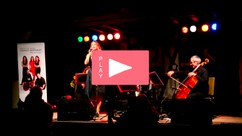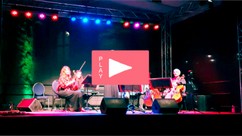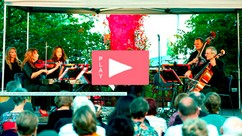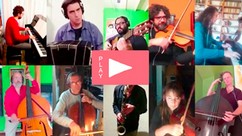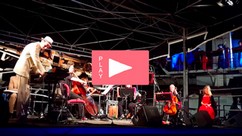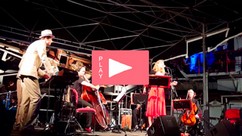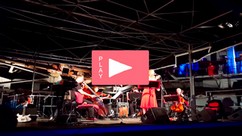Recording media:
At concerts and performances we have CDs with
us, which you can buy. Would you like to receive a CD? You are welcome
to write us an email.
Unerhört - TANGO MISTERIO (2011)
01. Tango
02. El Tigre Milan
03. Maria
04. Milonga
05. La Rayuela
06. Valse Criollo
07. La Cumparsita
08. Vuelvo Al Sur
09. Misteriosa Vida
10. Se Fu Sin Decirme Adios
11. Es Major Olvidar
12. Comme Il Faut
13. Oblivion
14. Vuelvo Al Sur (Reprise)
el viaje - TANGO MISTERIO (2024)
01. Tocata rea aus der Oper María de Buenos Aires und Libertango
02. Chiquilìn de Bachin
03. Comme il faut
04. Garganta con arena
05. Balada para un loco
06. Fuga y misterio
07. Uno
08. Por una cabeza
09. Volver
10. Notas del corazón
11. La cumparsita
12. La ùltima curda
This album is also available at Bandcamp https://tangomisterio.bandcamp.com for download.
Uno - Someone - Tango from 1943
Concert on the main stage at the Untermarkt for the Görlitz Old Town Festival
The music is by Mariano Mores (real name: Mariano Martinez), born February 18, 1918 in Buenos Aires, died in 2016. Mores was a pianist, conductor and composer. Written by Enrique Santos Discépolo, born March 27, 1901 in Buenos Aires, died 1951.
Discépolo was a poet, composer, actor and dramaturge.
Por una cabeza - By a horse's head length, Tango from 1935
Concert on the main stage at the Untermarkt for the Görlitz Old Town Festival
The lyrics are about a player who compares his gambling addiction in horse racing with the unfulfilled attraction of a beautiful woman.
"... because of a head length, loss of bet one day, that flirtatious and cheerful woman who lies smiling of love, and burns all my love at the stake ..."
The text was written by Alfredo Le Pera, born June 7, 1900 in Brazil, died in 1935. Le Pera was a journalist, poet and writer. The music is by Carlos Gardel (real name: Charles Romuald Gardès), born on December 11, 1890 in France (and Dec. 1887 in Uruguay). Gardel was a composer, singer and film actor.
Gardel and Le Pera died in a plane crash in 1935.
Balada Para Un Loco - Ballad of a mad man, Tango from 1969
Final concert of Dornburg Castles Night
The title tells of a special one, a fool strolling through the streets of Buenos Aires.
".... You laugh, only you see me. The mannequins blink at me, the traffic lights give me three times sky-blue light and the oranges from the greengrocer on the corner throw their flowers to me..."
Lyrics by Horacio Ferrer (born in Uruguay, died 21 December 2014 in Buenos Aires) Ferrer was a poet, lyricist, journalist and writer. Set to music by Astor Pantaleón Piazzolla (born 11.03.1921 in Mar Del Plata, died 1992). He played piano and especially bandoneon, was a composer and arranger, not only of tangos, but also of serious music. With his orchestra Octeto Buenos Aires, founded in 1955, he is considered the founder of Tango Nuevo.
Chiquilin de Bachin - The Boy from Bachin, Vals from 1969
Final concert of the Dornburg Castles Night
The title is about a boy who sells roses in a pub, who lives in poverty on the streets and has to feed on the remnants of society, who is forgotten by society.
Lyrics by Horacio Ferrer (born in Uruguay, died 21 December 2014 in Buenos Aires) Ferrer was a poet, lyricist, journalist and writer. Set to music by Astor Pantaleón Piazzolla (born 11.03.1921 in Mar Del Plata, died 1992). He played piano and especially bandoneon, was a composer and arranger, not only of tangos, but also of serious music. With his orchestra Octeto Buenos Aires, founded in 1955, he is considered the founder of Tango Nuevo.
Corazon De Oro - Heart Of Gold, Vals from 1928
Final concert of the Dornburg Castles Night
The music is by Francisco Canaro (real name: Francisco Canarozzo, born November 26, 1888 in Uruguay, died 1964. Canaro also bore the names "Pirincho" or "El Kaiser". He was a violinist, mandolinist, arranger, and composer.
Los mareados - The drunken, Tango from 1942
Final concert of the Dornburg Castles Night
The music is by Juan Carlos Cobián (Goubián; El Aristócrata del Tango, born on 31 May 1896 in Buenos Aires, died on 10 December 1953). Cobián was a pianist, conductor, composer and writer.
The text was written by Enrique Domingo Cadícamo, born on July 15, 1900 in Buenos Aires, died on December 3, 1999. Cadícamo used the pseudonyms Rosendo Luna and Yino Luzzi for his texts. He was a composer and writer.
Oblivion - Tango from 1982 - film music from Enrico IV (1984, Henry IV) from Marco Bellochio.
Final concert of the Dornburg Castles Night
Written by Astor Pantaleón Piazzolla (born 11.03.1921 in Mar Del Plata, died 1992). He played piano and especially bandoneon, was a composer and arranger, not only of tangos, but also of classical serious music. With his orchestra Octeto Buenos Aires, founded in 1955, he is considered the founder of Tango Nuevo.
Volver - Return, Tango from 1935
Final concert of the Dornburg Castles Night
The music is written by Carlos Gardel (real name: Charles Romuald Gardès), born at 11. December 1890 in France (or Dez. 1887 in Uruguay). Gardel was a composer, singer and film actor.
The text was written by Alfredo Le Pera, born 07. Juni 1900 in Brasil. Le Pera was a journalist, poet and writer.
Gardel and Le Pera died in a plane crash in 1935.
Milonga de mis amores - Milonga meiner Lieben, Milonga aus dem Jahr 1937
Bautzner chamber concerts, concert in the Britze-Garten with Carlos Rulfi from La Plata (Argentina) on the bandoneon
The music is written by Pedro Laurenz (born 10. October 1902 in Buenos Aires, died 7. July 1972, real name Pedro Blanco Acosta). Laurenz was bandoneonist, orchestra leader and composer. The text is from José María Contursi (nickname Katunga, born 31. Oktober 1911 in Buenos Aires, died 11. Mai 1972). Contursi was a writer and poet.
Fuga y misterio - Escape and Mystery
Bautzner chamber concerts, concert in the Britze-Garten with Carlos Rulfi from La Plata (Argentina) on the bandoneon
Written by Astor Pantaleón Piazzolla (born 11.03.1921 in Mar Del Plata, died 1992). He played piano and especially bandoneon, was a composer and arranger, not only of tangos, but also of classical serious music. With his orchestra Octeto Buenos Aires, founded in 1955, he is considered the founder of Tango Nuevo.
De tal palo - About such a stick, Tango from the year 1912
Bautzner chamber concerts, concert in the Britze-Garten with Carlos Rulfi from La Plata (Argentina) on the bandoneon
A Titel from Juan Manuel Mallada (born 21. May 1889 in Buenos Aires) Mallada was composer and orchestra leader.
Otoño Porteño - Autumn in Buenos Aires, from 1970
Bautzner chamber concerts, concert in the Britze-Garten with Carlos Rulfi from La Plata (Argentina) on the bandoneon
First part of the Cuatro Estaciones Porteñas (For Seasons). Astor Pantaleón Piazzollas For Seasons do start with autumn (Otoño - autumn, Invierno - winter, Primavera - spring und Verano - summer)
Derecho Viejo - Old Law
The music was written by Eduardo Arolas (real
name: Loreno Arola), born 24 February 1892 in Buenos Aires, died 1924.
He was also called El Tigre del bandoneon. Arolas was a bandoneonist,
composer and conductor.
Arranged by Sergio Martin Rodriguez.
With Sexteto Bonavena (Argentina) and Tango Misterio
Piano: Sebastian Boeris und Anja Konjen
Bandoneon: Nicolas Placido
Bass Clarinet: Federico Nunez
Guitar: Sergio Martin Rodriguez
Viola: Pablo Mancini
Violin: Katrin Wehle
Cello: Hellfried Knopsmeier
Double Bass: Luis Carcacha und Alexander Göpfert
Milonga
Excerpt from a joint concert with Wenzel Konjen (drums), the Paranormal String Quartet and Falk Schönfelder.
The Milonga is the cheerful and exhilarating sister of tango. This milonga is by Diego Marcelo Collatti, a contemporary composer, pianist and author who was born in Argentina in 1995.
Vuelvo Al Sur - I go back to the South
Excerpt from a joint concert with Wenzel Konjen (drums), the Paranormal String Quartet and Narvas Schöne Felder.
The text is a poem about the intimate love to the South.
... I carry the South as the destiny of the heart. I come from the south, like the air out of the Bandoneon ...
A composition by Astor Pantaleon Piazzolla
(born 11.03.1921 in Mar Del Plata, died 1992). He played piano and
especially bandoneon, was a composer and arranger, not only of tangos,
but also of classics. With his orchestra Octeto Buenos Aires, founded
in 1955, he is considered to be the founder of Tango Nuevo.
The text is written by Pino Solanas (born Fernando Ezequiel Solanas), born 16 February 1936 in Argentina.
Solanas
studied theatre, piano, composition and law, and was (and in some
cases still is) a lyricist, composer, film director, screenwriter and
is politically engaged.
Garganta Con Arena - Throat with sand - a tango from 1993
Excerpt from a joint concert with Wenzel Konjen (drums), the Paranormal String Quartet and Narvas Schöne Felder.
"Look! The day is not dawning (yet), Polaco Coyenesche, sing me another tango.
See!
The night, it's still long. Your life has the destiny to sing, to sing
over and over again....Your voice, of goblins and ghosts, breathes
like the asthma of an old bandoneon."
The title tells about the characterful tango singer Roberto Goyeneche 'El Polaco' (1926-94).
Goyeneche
is said to have pursued an independent and unconventional artistic
lifestyle as a bon vivant. His voice is clearly recognisable among the
many.
Lyrics and music were written by Cacho Castaña
(born Humberto Vicente Castagna), born 11 June 1942 in Buenos Aires,
died in 2019. Castaña was a singer, lyricist and composer at the same
time.

